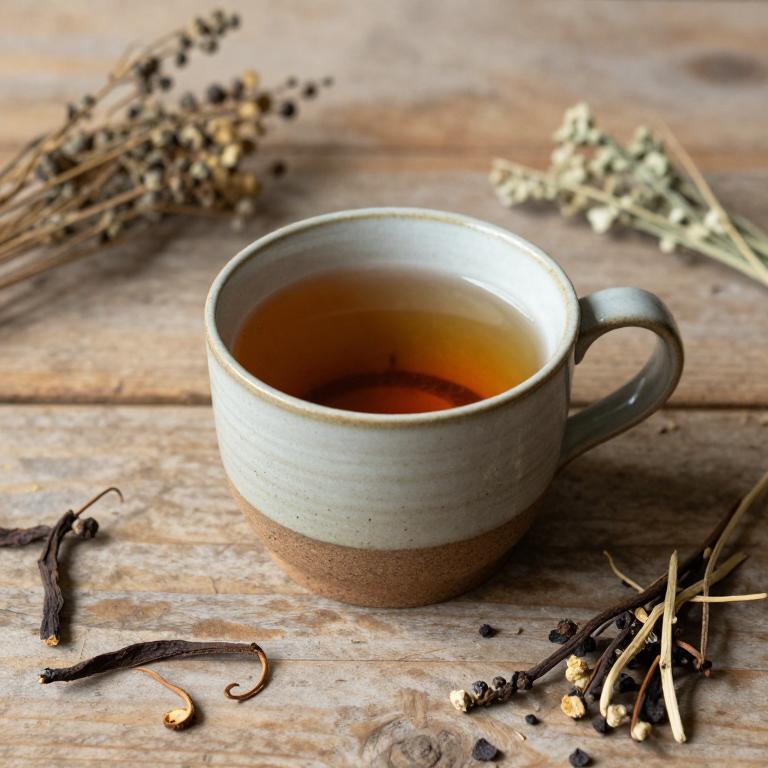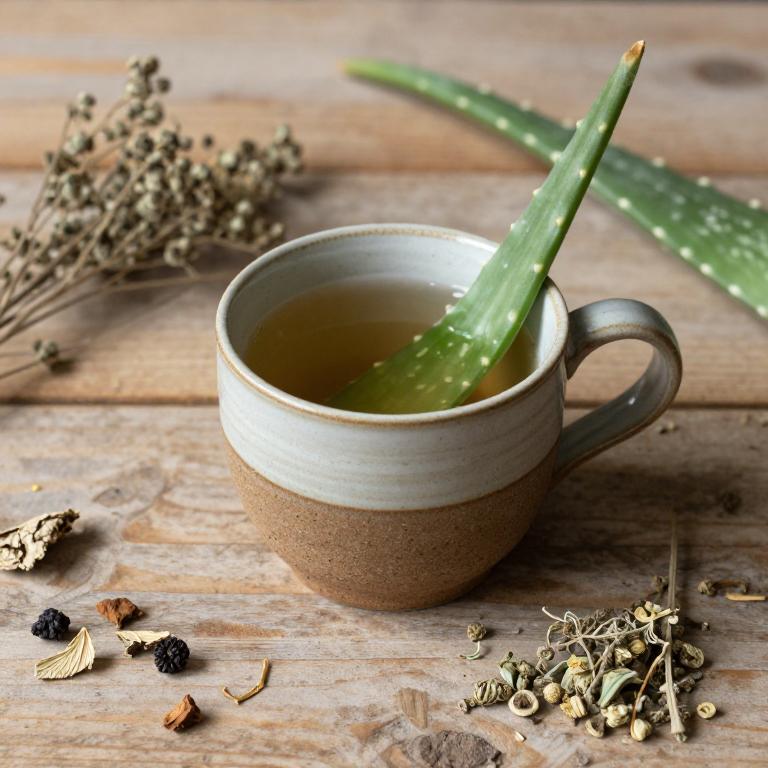10 Best Herbal Teas For Open Wounds

Herbal teas can be beneficial for open wounds when used appropriately, as certain herbs possess anti-inflammatory, antimicrobial, and healing properties.
Chamomile, calendula, and lavender are commonly used in herbal teas due to their soothing and antiseptic qualities. These teas can help reduce swelling, prevent infection, and promote tissue regeneration when applied topically to the wound. However, it is important to consult a healthcare professional before using herbal teas on open wounds, especially if the injury is severe or shows signs of infection.
While herbal teas may offer some relief, they should not replace proper medical care for serious wounds.
Table of Contents
- 1. Marigold (Calendula officinalis)
- 2. St. john's wort (Hypericum perforatum)
- 3. Echinacea (Echinacea purpurea)
- 4. Cancer bush (Sutherlandia frutescens)
- 5. Stinging nettle (Urtica dioica)
- 6. Yarrow (Achillea millefolium)
- 7. Dog rose (Rosa canina)
- 8. Salvia (Salvia officinalis)
- 9. Blessed thistle (Cnicus benedictus)
- 10. Aloe vera (Aloe barbadensis)
1. Marigold (Calendula officinalis)

Calendula officinalis, commonly known as pot marigold, is a popular herbal remedy used in the preparation of teas for the treatment of open wounds.
Its active compounds, including flavonoids and triterpenoids, possess anti-inflammatory, antimicrobial, and wound-healing properties that support the body’s natural recovery process. When brewed into a tea and applied topically, calendula can help reduce inflammation, prevent infection, and promote the regeneration of skin tissue. However, it is important to note that calendula tea should not be consumed internally if one has allergies to plants in the Asteraceae family.
For optimal results, it is recommended to use calendula-infused oils or ointments rather than drinking the tea for wound care.
2. St. john's wort (Hypericum perforatum)

Hypericum perforatum, commonly known as St. John's wort, has been traditionally used in herbal teas to support healing in open wounds due to its anti-inflammatory and antimicrobial properties.
The tea is believed to promote tissue regeneration and reduce the risk of infection by creating a protective barrier over the wound. While it is often used externally, some formulations may be ingested to support overall immune function and healing processes. However, it is important to consult a healthcare professional before using St. John's wort, as it can interact with certain medications.
Despite its historical use, scientific evidence on its efficacy for wound healing remains limited, and it should not replace conventional medical treatments.
3. Echinacea (Echinacea purpurea)

Echinacea purpurea, commonly known as purple coneflower, is a popular herbal remedy often used in teas to support the immune system and promote healing.
While it is widely recognized for its potential benefits in colds and infections, some studies suggest it may also aid in the healing of minor open wounds by reducing inflammation and preventing infection. The active compounds in echinacea, such as alkamides and flavonoids, are believed to stimulate the body's immune response and enhance tissue repair. However, it is important to note that echinacea should not replace professional medical care for serious wounds, and individuals with allergies or certain health conditions should consult a healthcare provider before use.
Overall, echinacea purpurea herbal tea may offer supportive benefits for minor wounds when used as part of a holistic approach to healing.
4. Cancer bush (Sutherlandia frutescens)

Sutherlandia frutescens, also known as "cancer bush," is a traditional African herbal plant that has been used for centuries in various medicinal practices.
While it is commonly associated with cancer treatment, it is also believed to have properties that may support wound healing when used in herbal teas. The plant contains a variety of bioactive compounds, including alkaloids and flavonoids, which may contribute to its potential anti-inflammatory and antimicrobial effects. Some preliminary studies suggest that Sutherlandia frutescens may help reduce inflammation and promote tissue regeneration, making it a possible complementary therapy for open wounds.
However, more scientific research is needed to fully understand its efficacy and safety in wound care applications.
5. Stinging nettle (Urtica dioica)

Urtica dioica, commonly known as stinging nettle, has been traditionally used in herbal medicine for its potential healing properties.
When prepared as a tea, it may help reduce inflammation and promote tissue repair in open wounds due to its high content of antioxidants and anti-inflammatory compounds. However, it is important to note that while some studies suggest possible benefits, there is limited clinical evidence supporting its effectiveness for wound healing. As with any herbal remedy, it should be used with caution and under the guidance of a healthcare professional, especially for open wounds that may require more intensive medical care.
Always ensure the tea is properly prepared and free from contaminants to avoid adverse reactions.
6. Yarrow (Achillea millefolium)

Achillea millefolium, commonly known as yarrow, has been traditionally used in herbal medicine for its wound-healing properties.
When prepared as a herbal tea, it can help reduce inflammation and promote the healing of minor open wounds due to its antimicrobial and astringent qualities. The active compounds in yarrow, such as flavonoids and essential oils, contribute to its ability to clean and soothe damaged skin. However, it is important to consult with a healthcare professional before using yarrow tea on open wounds, especially if there is a risk of infection or if the individual has allergies or is taking medications.
While yarrow tea may offer supportive benefits, it should not replace professional medical treatment for more severe injuries.
7. Dog rose (Rosa canina)

Rosa canina, also known as rosehip, is a herbal tea that has been traditionally used for its anti-inflammatory and antioxidant properties.
When brewed as a tea, it can help promote healing in open wounds by reducing inflammation and supporting the body's natural repair processes. The high vitamin C content in rosehip tea aids in collagen synthesis, which is essential for tissue regeneration. Additionally, it may help prevent infections due to its antimicrobial properties.
However, while it can be a supportive remedy, it should not replace professional medical care for serious wounds.
8. Salvia (Salvia officinalis)

Salvia officinalis, commonly known as sage, has been traditionally used in herbal medicine for its potential healing properties.
When brewed into a tea, sage may help reduce inflammation and promote tissue repair, making it a popular choice for treating minor open wounds. The plant contains compounds such as rosmarinic acid and flavonoids, which have antimicrobial and antioxidant effects that may aid in preventing infection and supporting the healing process. However, it is important to note that while sage tea may offer some benefits, it should not replace professional medical care for serious wounds.
Always consult a healthcare provider before using herbal remedies, especially if you have underlying health conditions or are taking medications.
9. Blessed thistle (Cnicus benedictus)

Cnicus benedictus, commonly known as blessed thistle, has been traditionally used in herbal medicine for its potential healing properties, including its application in herbal teas for open wounds.
The herb contains compounds such as sesquiterpene lactones and flavonoids, which may help reduce inflammation and promote tissue repair. When brewed into a tea, blessed thistle is believed to support the body's natural healing processes by enhancing circulation and reducing infection risk. However, it is important to note that while some studies suggest its efficacy, more clinical research is needed to confirm its benefits for wound care.
As with any herbal remedy, it should be used under the guidance of a healthcare professional, especially for severe or persistent wounds.
10. Aloe vera (Aloe barbadensis)

Aloe barbadensis, commonly known as aloe vera, has been traditionally used for its soothing and healing properties, making it a popular ingredient in herbal teas for open wounds.
These teas are believed to promote wound healing by reducing inflammation and preventing infection due to the presence of antioxidants and anti-inflammatory compounds. The gel-like substance within the aloe leaf contains enzymes that may help in tissue repair and regeneration, supporting the body’s natural healing processes. While herbal teas made from aloe vera are generally considered safe for topical use, they should not replace professional medical treatment for severe wounds.
It is important to consult a healthcare provider before using aloe-based products, especially for individuals with allergies or existing health conditions.